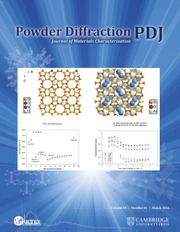Article contents
Stability and structure changes of Na-titanate nanotubes at high temperature and high pressure
Published online by Cambridge University Press: 24 April 2014
Abstract
Stability of Na-titanate-based nanotubes at high temperature and pressure is investigated using X-ray diffraction and energy-dispersive X-ray diffraction (EDXRD). Our results show that the nanotubes can be stable at ~400 °C. Higher temperature annealing of nanotubes result in opening and flattening of the nanotubes, and subsequent structural transformation to Na2Ti6O13-based structure via an intermediate phase with Na0.23TiO2-like structure. In situ EDXRD using diamond anvil cell indicates that the nanotubes collapse at about 15 GPa, and are finally transformed into an amorphous phase at about 30 GPa. The nanotubes kept in an amorphous state were further compressed to 50 GPa according to our in situ EDXRD observation. Titanate nanotubes are mechanically stronger than carbon nanotubes under static compression.
- Type
- Technical Articles
- Information
- Copyright
- Copyright © International Centre for Diffraction Data 2014
References
- 5
- Cited by


